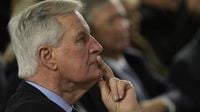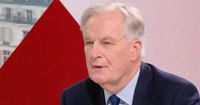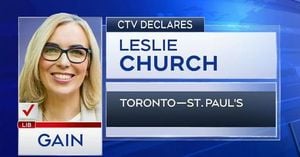Michel Barnier, the former Prime Minister of France, recently shared his thoughts on the current political landscape and the upcoming challenges facing political parties in the country. Speaking on BFMTV-RMC, Barnier, who served a brief term from September 5 to December 13, 2024, expressed that political parties will have to "render accounts" at the next presidential election in 2027. This statement comes in the wake of a significant political event where a motion of censure against his government was passed by the National Assembly on December 4, 2024, marking a pivotal moment in French politics.
During his interview, Barnier emphasized that the primary interest of the nation should have been to manage the budget responsibly, particularly in light of France's growing deficit. "The interest of the country was that everyone takes their share of France's deficit and helps reduce it for our children," he stated, reflecting on the responsibilities of political leaders. He criticized the actions of various political parties, notably targeting the Rassemblement National (RN) for voting in favor of the censure motion, which he described as motivated by "totally tactical and opportunistic" reasons.
Barnier's tenure was notably short, as his government faced opposition from multiple parties, resulting in a censure motion that received 331 votes in favor, a significant majority in the Assembly. This motion was unprecedented in the history of the Fifth Republic, making Barnier's government one of the shortest-lived. He pointed out that the left-wing parties, including the Socialist Party (PS), La France Insoumise (LFI), and others, joined forces to vote against him, a move that he believes did not serve the national interest.
Reflecting on his brief time in office, Barnier revealed his "greatest disappointment" during his tenure, stating that he felt let down by the PS, which he believed did not act as a responsible governing party. "The Socialist Party has not been up to par," he lamented, adding that he hoped the party would regain its footing in future political endeavors. Barnier also noted the tactical alliances formed during the censure vote, particularly how Marine Le Pen's RN allied with the far-left, which he found particularly disheartening.
Despite the challenges he faced, Barnier does not regret his decisions during his time as Prime Minister. He expressed a preference for being "unpopular" yet "responsible" over being "irresponsible." In a candid moment during the interview, he acknowledged that his commitment to truth-telling may have contributed to his political downfall, admitting, "Possibly." However, he remains hopeful for the future of the current government led by François Bayrou, wishing it success and stability.
In addition to his political reflections, Barnier is preparing to release a new book titled "Ce que j’ai appris de vous. Cinquante ans de leçons politiques" (What I Learned from You: Fifty Years of Political Lessons), set to be published on June 4, 2025. This book will draw on his extensive political career, beginning with his first election in 1973 and reflecting on his recent experiences in Matignon.
On April 15, 2025, Barnier re-emerged in the media to offer insights on the pressing issues of the national budget and debt, which have been brought to the forefront by his successor, François Bayrou. He critiqued the government's target of 40 billion euros in savings, deeming it insufficient. "I don't believe that will be enough," he stated, indicating that without more substantial measures, the government would face greater challenges in balancing the budget by 2026. "It's a start," he acknowledged, but warned that the path ahead would be difficult.
As Barnier navigates his post-political career, he also serves as an advisor for the 2030 Olympic Games alongside Edgar Grospiron. He has expressed gratitude for the support of his wife, Isabelle, and family throughout his political journey, stating, "I have always taken the time to be with Isabelle, my children, my grandchildren." This personal touch adds a layer of depth to his public persona, showcasing the importance of family during challenging times.
As France approaches the next presidential election, Barnier's insights and critiques will likely resonate with voters looking for accountability from their leaders. His experience and reflections on the political landscape serve as a reminder of the complexities of governance and the importance of prioritizing the nation's interests over party politics. With the political climate ever-changing, all eyes will be on the parties as they prepare for the upcoming electoral showdown in 2027.






